- Home
- Charles L. Grant
Riders in the Sky - [Millennium Quartet 04] Page 20
Riders in the Sky - [Millennium Quartet 04] Read online
Page 20
“About what?” Starshine asked sullenly.
Jude shrugged. “I don’t know. Anything.”
Starshine stamped her feet again and yanked on her cap’s brim. She muttered something Moonbow didn’t catch, but she figured it wasn’t too bad, because Momma didn’t start yelling again, she only rapped a knuckle against Star’s thigh.
Star said, “Ouch,” but she didn’t move away.
A car backfired on the road.
They could hear a pair of male voices raised in drunken argument.
“Nice place,” Star said, her sarcasm thick.
“We’ll be out of here in the morning, dear.”
“And then where, Momma? Then where do we go?” Starshine pushed off the log and walked to the riverbank’s edge, swatting at the reeds that grew up to her waist. “When are we going to stop, Momma, huh? Is this what we’re gonna do for the rest of our lives?”
Moonbow tried to signal her sister to shut up, but it was too dark now, and the fog too thick. If it hadn’t been for the window lights, she wouldn’t be able to see her at all.
“Darling,” her mother said patiently, “I know you’re tired. I know you’re disappointed about leaving all your new friends. But—”
“I’m not disappointed,” Star said angrily. “I’m sick, Momma. I’m sick of it all. I want... I want...”
“To go home,” Moonbow whispered. She leaned against Jude’s arm and sighed loudly. “It isn’t fair, Momma. You know this isn’t fair.”
“But...” Jude’s hands fluttered helplessly across her lap, through the air in front of her face, back to her lap again. “But we have to do this, kids. We have to. It’s important.”
Starshine yanked a reed out by the roots and flung it as far as she could into the river. “Please, Momma, don’t tell us about the stupid dream again, okay?”
Jude’s voice hardened. “It isn’t stupid. Believe me, it is not stupid.”
“Enough, Momma, okay?” Star said wearily, and she trudged back to the log, sat next to her sister. “Enough. We don’t want to hear it anymore.”
“Is that true, Bow? Is that really true?”
Moonbow shuddered at the pain in her mother’s voice, but she couldn’t deny that Star was right. They had been dragged across more than half the country, no say at all in where they were going, what they were going to do. In the beginning it was kind of fun, an adventure, like one of those quests she saw in the movies and read in her books.
It used to be fun, staying out of school, living in a different place every day, eating in diners and fast food restaurants and real restaurants every day; it used to be fun, until they had settled in Missouri and were reminded of what it was like, how nice it was not to be moving anymore, how nice it was to be able to come back to the same room, the same beds, the same house.
Every day.
“Oh, Lord,” Jude said, and pushed herself to her feet. “Oh, Lord, dear God, what the hell have I done?”
* * * *
2
Beatrice, hands cupped under her head, lay on a queen-size bed that sagged almost comically in the center. She would have moved to the other one, but that mattress had a depression at the top that made it feel as if her head were hanging over a great hole. The ceiling, stained and peeling and sagging itself a bit near the far wall, appeared to recede when she stared at it too long, but there was nothing else to look at in this miserable little room. The television barely worked, the furniture was barely adequate, and when she’d looked through the mildewed drapes a few minutes ago, all she could see was that horrid little bar across the road.
If she could sleep, it would solve everything. At least for the time being. If she could sleep, she’d be shut of the children’s complaints and Jude’s silent protests and her own persistent doubts that somehow she had made a terrible mistake.
Sir John, she thought, I think I’m going to stop.
My dear Beatrice, he answered, his form thin and shimmering in front of the chipped and streaked door, you know you can’t do that.
Yes, I can, dear. Believe me, I can.
And what will you do, then?
She sighed, shifted, and said aloud, “I’ll go back to that lovely place we just left. The children love it there, nobody bothers Jude, and I think I can get my old job back.”
Darling, really ... selling houses?
“I was getting damn good at it, I’ll have you know.”
Yes. Perhaps you were.
“And I’ll get better, believe me. And when we have enough money, we can move to a bigger place, with more people, more things to do, and I’ll sell even more houses, John, and ... and ... do whatever I want and not have to worry about a bloody damn thing.”
The ghost—if it was a ghost; she couldn’t be sure, and she really didn’t give a damn—smiled wanly, shook its head sadly.
My dear, you can dream about selling castles in Wales for all I care, but it isn’t going to change a thing. You cannot go back. You must go on.
A series of backfires made her jump, loud voices and stumbling footsteps had her squinting to be sure she’d put the latch on the door.
“John—”
I’m sorry, my dear, truly I am. Besides, how will you ever find someone else to love if you go back to that dreadful Missouri place?
“John, don’t be silly.”
I’m not, Beatrice, I’m not. In case you haven’t noticed, I’m rather dead, and you’re too young to be in mourning for the rest of your life.
“John, you haven’t even been gone two years, for heaven’s sake. It would be ... I don’t know, unseemly.”
Two years, two centuries, what difference does it make?
“Two centuries would mean I’m dead as well.”
The figure smiled broadly, touched the side of its nose, and pointed at her with a long trembling finger.
Temper, my darling, temper.
Beatrice rolled onto her side, facing the wall.
That won’t do it, you know, Bea. I’m still here.
“Don’t I know it, you old goat,” she muttered.
Sounds of a scuffle outside had her rolling over and sitting up quickly, feeling her heart beating hard, feeling a ribbon of cold encircle her neck.
Go on, my dear, the ghost told her gently; you really don’t have a choice, you know. It’s coming. Coming soon. And you have your part to play.
“Damn you, John Harp, I wish you were really here so I could strangle that scrawny little neck of yours.”
What, and have to die all over again? I think not, my dear. I’ll just stay in your imagination for a while longer, if you don’t mind. It’s so much safer.
She grinned, shook her head, and pushed a rough hand through her short brown hair, grimaced and raked her fingers through her bangs. She must be getting dotty, that’s the only explanation, arguing with a ghost and threatening to kill it. Dotty, and tired, and not a little afraid.
“Sir John,” she said.
And someone hammered on the door.
* * * *
3
Moonbow watched her mother pace in front of them, hands gesturing helplessly, mumbling, looking up now and again to the sky.
“Star,” she whispered.
Starshine shook her head sharply, an order to be quiet.
Not fair, Moonbow thought; Momma believes and we don’t. It’s not fair.
Pinpricks of damp cold as the fog drifted over her face; the cry of a mournful bird deep in the woods across the river. In one of the rooms behind her someone turned on a TV, music and voices blending harshly and loudly. A car’s engine. A truck’s rumbling. When she checked over her shoulder, the window lights were smeared and fading.
“Momma? Momma, maybe we’d better go inside now.”
“I need to think,” her mother said. “I need a minute to think.”
“There’s nothing to think about,” Starshine told her. “We’re tired, Momma. We’re sick of it.”
“No,” Jude answered sharply, harshly.
She spun around, faced them, and the girls recoiled. “You think I’m not tired, Star? Do you really think this is the way I dreamed of bringing up my girls?” She took a step closer, lowered her voice. “Do you honestly believe that this,” and she spread her arms, “is the way I want us to live?”
Moonbow felt her sister trembling, grabbed her hand, and squeezed it hard to stop her from answering.
“Trey Falkirk died so we could get away, and don’t you ever forget it,” Jude said, each word the crack of a fierce barbed whip. “He loved us all, you know that more than anyone, and he did what he had to do so we could do what we have to do.” A hand lifted quickly. “Don’t ask, Star, don’t ask, because I don’t really know. All I know is, Lady Beatrice agrees that we have to keep on, we have to find that man I saw. We have to find him soon.” The hand dropped as if it were too heavy to hold up. “After that... I don’t know. I do not know. But I do know that if we stop now ...”
She looked up, looked back and touched the weighted bottom of her veil with one finger. “If I can live with this for the rest of my life, you can live with me just a little while longer.”
“Not fair,” Star said quietly. “That’s not fair, Momma.”
“No,” she said flatly. “It isn’t.”
Moonbow was surprised. This wasn’t like Momma, not like her at all, using what had happened to her face to make them do what she wanted. She’d never, ever done it before, and it was more than a little frightening now.
“All right, Momma,” she said, giving Star’s hand another squeeze, more gently this time.
Starshine slumped in defeat and said again, quietly, “It’s still not fair.”
“I’ll make it up to you,” Jude said, dropping to her knees in front of them, a hand on their knees. “I swear to God, I’ll make it up—”
The first scream stopped her.
The second one brought the girls to their feet.
“Lady Bea,” Starshine shouted, and jumped over the log, sprinted for the motel.
Moonbow and Jude were right behind her when they raced around the corner, right behind her when she reached the concrete walk that stretched the length of the building. They reached the door to their room together, and Moonbow froze.
Lady Beatrice was on the far bed, skirt bunched up around her waist, a nearly bald, pot-bellied man standing beside her, leaning over her, pinning her arms down by leaning on her wrists. A long-haired man with a backward-turned ball cap on knelt on the mattress, his jeans bunched around his ankles, ignoring her thrashing as he tried to rip her panties off her hips.
Starshine shrieked and charged into the room, leaped on the kneeling man’s back, and began to pummel his head with one hand while reaching around to claw at his eyes with the other. The man roared in surprise, then laughed, and with one arm flung her off and against the wall. She hit hard and didn’t move and all Moonbow could think of was that she looked like a broken doll.
Momma didn’t run, didn’t yell.
Moonbow watched, unable to move, as she walked over to the suitcase by the TV, opened it, and reached in.
“Hey, bitch,” the second man said with a near toothless grin, “you don’t have to—”
He shut up when he saw the gun.
“Damnit, bitch,” the kneeling man said, then punched Beatrice twice in the face. “Hold still, damnit.”
“Get off her,” Jude ordered calmly, and pulled the hammer back.
The second man blinked stupidly; the kneeling man punched Beatrice again and looked over his shoulder. “Aw, Jesus,” he said in disgust, “go to hell and wait your turn, huh? I’ll be done in a minute.”
Moonbow clamped her hands over her ears when Momma pulled the trigger; she turned away when the kneeling man snapped upright with a strangled gasp and a large red stain spread across his upper back; she leaned against the wall and didn’t move, didn’t make a sound, couldn’t hear anything but shouting and firing and sirens and voices, and one kind voice that kept asking if she were all right, it’s over, don’t worry, hey, kid, hey, are you all right, did he hurt you?
She saw whirling lights that stained the fog red and blue, an ambulance that had backed up to the walk, men in uniform strutting around, people standing like dark ghosts in the fog watching and pointing, a man standing over her putting a blanket around her shoulders, someone on a stretcher covered head to toe with a sheet, Lady Beatrice huddled in the backseat of a police car talking to a lady cop, Starshine on a stretcher, oxygen mask over her nose and mouth.
Momma in handcuffs, taller than the two policemen who led her away.
That’s when she decided she couldn’t take anymore; that’s when she decided it would be better if she went away for a while. Somewhere in the dark where it wasn’t so cold; somewhere in the dark, without any fog.
* * * *
4
S
carlet fire and emerald sparks.
* * * *
No one is left in the houses around the deep Ozark lake, all the boats pulled up and taken away, or placed high on saw-horses and covered with tarp. Windows are either boarded or shuttered, doors bolted, all tools and playthings locked away for the season. The water is smooth, not a ripple on the surface. The sky high and pale as the moon rises above the mountains. The air sharp and cold, a razor waiting to be used.
* * * *
Scarlet fire.
Emerald sparks that blur through the sky like comets.
* * * *
Susan stands at the top of a grassy slope that leads down to the water, arms folded, chin tucked. Below, Joey stands with Eula on a short dock, the boy excitedly pointing at shooting stars and the old woman nodding, though she’s seen it all before.
There is no wind.
There is no sound.
Until Joey giggles at something Eula has said and runs off the dock, up the slope, and circles Susan three times before stopping, hands on his hips, panting and grinning. Eula follows much more slowly, her head down, white-gloved hands clasped at her stomach, purse dangling from a strap over one wrist.
“I saw a movie today,” Joey says, squinting at the stars.
“Did you,” Susan says, her tone impatient.
“There were these guys on these really really big horses. They had cloaks and hoods and spears and everything. There was smoke and clouds and they were riding really really slow, and there was all this awful loud music.” He scratched his forehead vigorously and frowned. “I think that was supposed to be us, right?”
Eula slipped but didn’t fall.
Susan said, “Yes, they were supposed to be us.”
“So how come we don’t look like them, huh?” He looked up at her. “How come, huh? They were neat.”
“Don’t matter, child,” Eula said, joining them, taking deep breaths, patting the back of a hand across her cheeks and brow. “We are what we are.”
“Yeah, but they were neat.”
* * * *
A mountain on the other side of the lake cuts a black hole in the sky, and above the hole, just for a moment, there is scarlet fire and green sparks and the sound of explosions that make the trees tremble.
* * * *
“It ain’t fair,” Joey pouts, standing downslope from the women, hands still on his hips. He uses his chin to point at the mountain. “He’s having all the fun.”
“Isn’t,” Eula corrects absently. “It isn’t fair.”
“That’s what I said.”
Susan can’t help it—she shakes her head and laughs, and Eula laughs with her.
“What?” Joey says, demanding. “What did I say that’s so funny, huh? You’re making fun of me again.”
“No, child,” Eula tells him, reaching out a hand to touch his shoulder. “No, child, we’re not.”
‘Then what are we waiting for?” he wants to know. His voice deepens as only a child’s can. “He hurt me. That man hurt me and I want to hurt him. I want to hurt him now.”
“Patience,” says Susan.
Joey t
urns and stamps a booted foot. “I’m out of damn patience.”
Eula straightens.
Joey glares at her for a second before bowing his head. “Sorry.”
“Better be.”
“I am.”
Susan grins. “No, you’re not.”

![[Oxrun Station] The Orchard Read online](http://i1.bookreadfree.com/i/03/17/oxrun_station_the_orchard_preview.jpg) [Oxrun Station] The Orchard
[Oxrun Station] The Orchard![Riders in the Sky - [Millennium Quartet 04] Read online](http://i1.bookreadfree.com/i/03/20/riders_in_the_sky_-_millennium_quartet_04_preview.jpg) Riders in the Sky - [Millennium Quartet 04]
Riders in the Sky - [Millennium Quartet 04]![Chariot - [Millennium Quartet 03] Read online](http://i1.bookreadfree.com/i/03/19/chariot_-_millennium_quartet_03_preview.jpg) Chariot - [Millennium Quartet 03]
Chariot - [Millennium Quartet 03]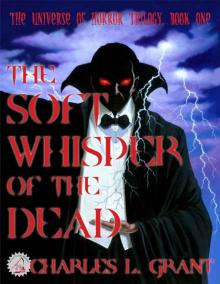 The Universe of Horror Volume 1: The Soft Whisper of the Dead (Neccon Classic Horror)
The Universe of Horror Volume 1: The Soft Whisper of the Dead (Neccon Classic Horror)![[Oxrun Station] Dialing The Wind Read online](http://i1.bookreadfree.com/i/03/19/oxrun_station_dialing_the_wind_preview.jpg) [Oxrun Station] Dialing The Wind
[Oxrun Station] Dialing The Wind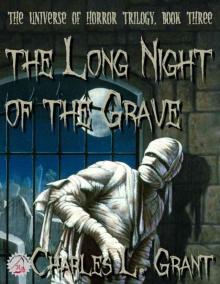 The Universe of Horror Volume 3: The Long Night of the Grave (Neccon Classic Horror)
The Universe of Horror Volume 3: The Long Night of the Grave (Neccon Classic Horror)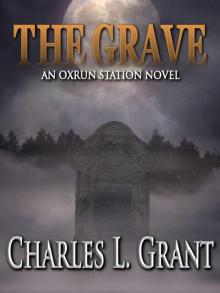 The Grave - An Oxrun Station Novel (Oxrun Station Novels)
The Grave - An Oxrun Station Novel (Oxrun Station Novels)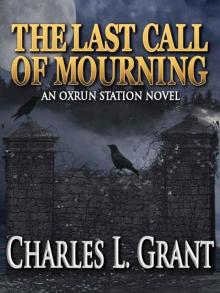 The Last Call of Mourning - An Oxrun Station Novel (Oxrun Station Novels)
The Last Call of Mourning - An Oxrun Station Novel (Oxrun Station Novels)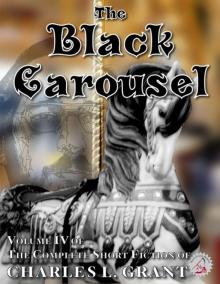 The Complete Short Fiction of Charles L. Grant, Volume IV: The Black Carousel
The Complete Short Fiction of Charles L. Grant, Volume IV: The Black Carousel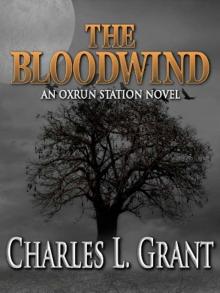 The Bloodwind - An Oxrun Station Novel (Oxrun Station Novels)
The Bloodwind - An Oxrun Station Novel (Oxrun Station Novels)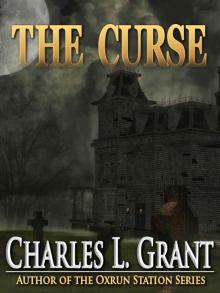 The Curse
The Curse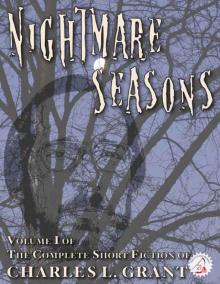 The Complete Short Fiction of Charles L. Grant Volume 1: Nightmare Seasons (Necon Classic Horror)
The Complete Short Fiction of Charles L. Grant Volume 1: Nightmare Seasons (Necon Classic Horror)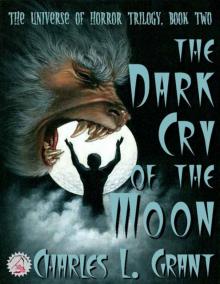 The Universe of Horror Volume 2: The Dark Cry of the Moon (Neccon Classic Horror)
The Universe of Horror Volume 2: The Dark Cry of the Moon (Neccon Classic Horror)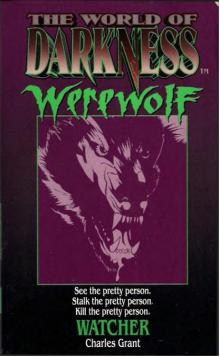 Watcher: Based on the Apocalypse (World of Darkness : Werewolf)
Watcher: Based on the Apocalypse (World of Darkness : Werewolf)![[Oxrun Station] The Bloodwind Read online](http://i1.bookreadfree.com/i/03/25/oxrun_station_the_bloodwind_preview.jpg) [Oxrun Station] The Bloodwind
[Oxrun Station] The Bloodwind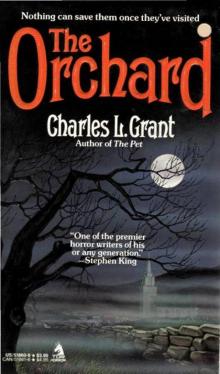 The Orchard
The Orchard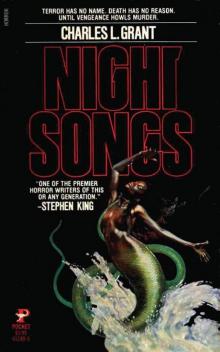 Night Songs
Night Songs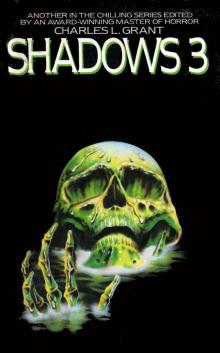 Shadows 3
Shadows 3![Symphony - [Millennium Quartet 01] Read online](http://i1.bookreadfree.com/i1/04/02/symphony_-_millennium_quartet_01_preview.jpg) Symphony - [Millennium Quartet 01]
Symphony - [Millennium Quartet 01] The Hour of the Oxrun Dead (Necon Classic Horror)
The Hour of the Oxrun Dead (Necon Classic Horror)![In the Mood - [Millennium Quartet 02] Read online](http://i1.bookreadfree.com/i1/03/31/in_the_mood_-_millennium_quartet_02_preview.jpg) In the Mood - [Millennium Quartet 02]
In the Mood - [Millennium Quartet 02]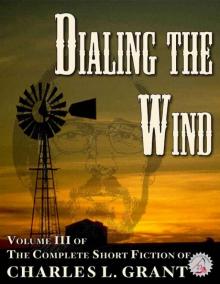 The Complete Short Fiction of Charles L. Grant Volume 3: Dialing the Wind (Neccon Classic Horror)
The Complete Short Fiction of Charles L. Grant Volume 3: Dialing the Wind (Neccon Classic Horror)![[Oxrun Station] The Last Call of Mourning Read online](http://i1.bookreadfree.com/i2/04/05/oxrun_station_the_last_call_of_mourning_preview.jpg) [Oxrun Station] The Last Call of Mourning
[Oxrun Station] The Last Call of Mourning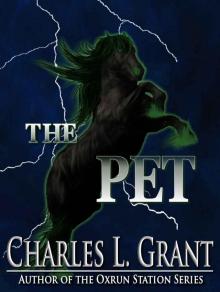 The Pet
The Pet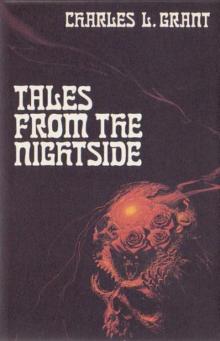 Tales from the Nightside
Tales from the Nightside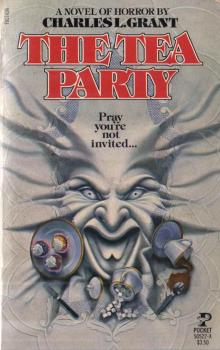 The Tea Party - A Novel of Horror
The Tea Party - A Novel of Horror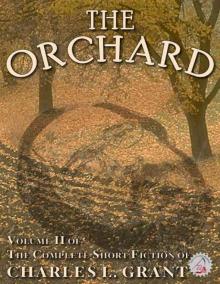 The Complete Short Fiction of Charles L. Grant Volume 2: The Orchard (Necon Classic Horror)
The Complete Short Fiction of Charles L. Grant Volume 2: The Orchard (Necon Classic Horror) Whirlwind
Whirlwind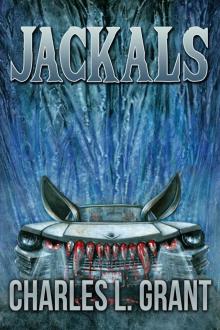 Jackals
Jackals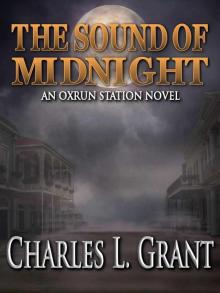 The Sound of Midnight - An Oxrun Station Novel
The Sound of Midnight - An Oxrun Station Novel